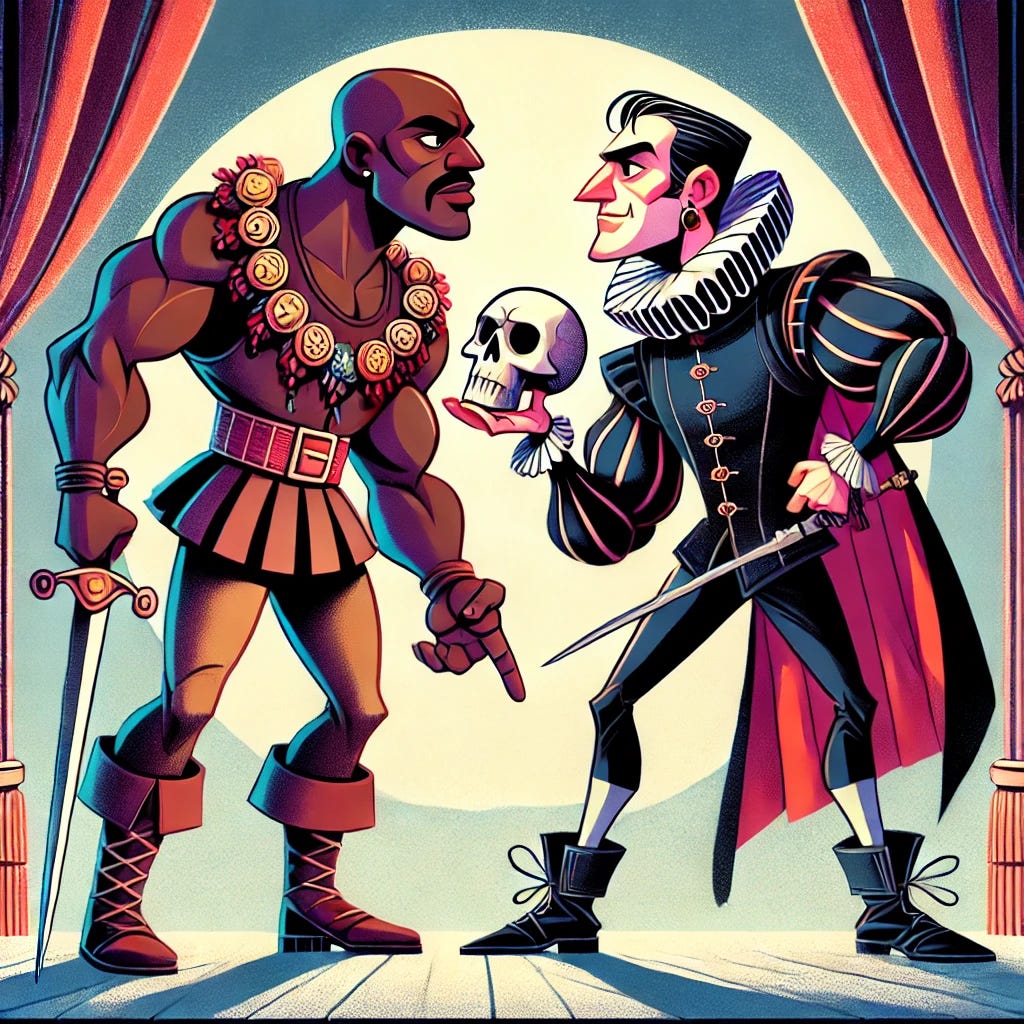Last January a group of forty-one others and I started our doctoral journies as the twenty-eighth cohort in the Organizational Change and Leadership program at USC’s Rossier School of Education. It’s not a theatre program, not a performance studies program, or English lit, or cultural studies, and yet it is all of these things. It is a program for leaders of industry to advance as change agents; to bring and use an equity lens to professional problems of practice; to develop as behavioral and social scientists; to use evidence-supported, data-driven research to innovate, advocate, and build a better, just, “more perfect union.”
On day one, the twenty or so of us who had enrolled in the Saturday morning section of Fundamentals of Creativity, Innovation, and Entrepreneurship were presented with a Hamlet-Othello polarity. Our professor (a brilliant economist) posed the dilemma that neither too slow to action nor too swift to action would get us where we were headed. However, our (brilliant) professor was sloppy with his language. He went on to say Hamlet “does nothing,” and Othello “kills everybody.”

I knew at that moment, that Shakespeare scholarship would follow me to the ends of the Earth and there would be no ignoring that calling. When I applied to the program, I thought I would dissertate about the lack of Black women as theatre profs in higher ed, or research the particularly jagged glass cliff Black women face while maintaining executive leadership positions in professional nonprofit theatre (if they even get hired in the positions at all). I enrolled on a quest to do something to understand/explain/soothe the fire in my gut and my anger with U.S. theatre. However, Shakespeare, race, and false narratives came for me on day one. We have used these iconic Shakespeare characters to promote false narratives and harmful tropes that get Black men killed while White men get away with murder.
We have come to criticize Hamlet’s inaction. Having been tasked to avenge his father’s death, Hamlet cannot seem to bring himself to kill his uncle Claudius, whom he believes to be the murderer. Hamlet is thought pensive, moody, and troubled. A perpetual intellect who lacks the drive or furry to follow through. Meanwhile, Othello is thought to be rash, lacking reason, lacking motive. Too full of emotion, too easily duped, violent, and barbaric. Complete opposites. And of course, at least in my professor’s framing, to be efficacious leaders, we need to manage that polarity. I challenged him to find a new example. Perhaps Cordelia and Goneril or Prospero and Lear. For if we are to be data-driven, and follow the evidence, there is no polarity between Hamlet and Othello, well certainly not that of inaction vs. fast action. Hamlet did way more than “nothing” and one of the two lives Othello takes is his own, from a place of deep remorse.
Here is the data: Hamlet kills five people, Othello two. One is too many for my taste, so I don’t condone either character’s behavior. Hamlet murders his first victim in 3.4, Othello 5.2. So proportionately, Hamlet’s killing spree starts much earlier. Hamlet believes the words of a ghost, Othello those of his trusted friend. Hamlet has no more ocular proof than Othello, and both are convinced through performative acts. Hamlet has scripted the scene and directed actors to elicit a confession while Othello has no idea that what he witnesses is staged at his expense. Hamlet’s perceived depression at the loss of his father is cited as the cause for his strange behavior, while Othello’s actual epilepsy and PTSD go unaided and barely acknowledged. Hamlet dies a “sweet prince,” Othello an “uncircumcised dog.”
I hope you’re making some critical connections right now. Here’s the polarity: Hamlet is a serial killer. Othello committed an act of murder-suicide. Hamlet is a white man and Othello is a Black man. So in my quest to be an efficacious leader and educator, how do I manage that polarity? The polarity that shows me we neglect the evidence in favor of false narratives. We misremember facts when it comes to the actions of white men and are rife with hyperbole when it comes to those of Black men. It’s insidious. It met me at the door on day one of a doctoral program built on the core tenet of equity. And I was the only Shakespeare scholar in the room. I was the only one who could point out the fallacy of the dichotomy: Hamlet “does nothing,” Othello “kills everyone.”
So I am going to keep studying Shakespeare, and I am going to keep talking about race, gender, disability, and more. So as long as Shakespeare looms so large, and brilliant economists can poorly cite him while using him as a catalyst in a room full of cross-sector leaders, someone has got to be there to challenge the narrative. Imma stay woke.
Coming in January! Episode 1 of Not Without Right: a Shakespeare in the Public Domain podcast releases January 3, 2025. Catch JaMeeka Holloway in the full episode.
Thank you to the paid Blackfuturist Shakespearean subscribers who make the podcast possible!




Dawn, I took you on as a director. However, your articulation and ability to communicate not only false dichotomies but mischaracterizations giving your reader an education (albeit mini) in Shakespeare is a meal in and of itself. Your article made me think and draw inference as it went from the 1400’s to the 2000’s. Keep writing. I need to keep reading.